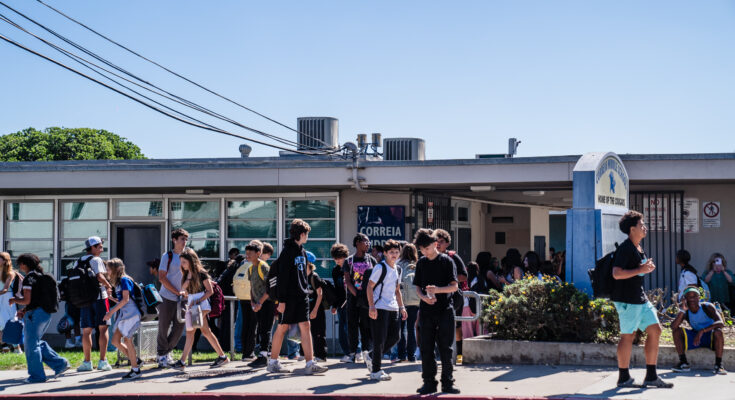After months of discussion, San Diego Unified’s board on Tuesday night voted unanimously to adopt a new policy that bans cell phone use during most of the school day.
The policy comes as districts across the country are tightening rules regulating cell phone use in schools. The crackdown itself is, at least partly, in response to a growing body of research that shows just how damaging cell phones and social media can be to kids’ mental health and their ability to learn.
During the meeting, Superintendent Fabiola Bagula said the policy helped to simplify and standardize a patchwork set of rules across the district. It was also crafted in partnership with students, parents and teachers, she added.
“Last time we talked about the superintendent’s evaluation, I talked about a value system, about democracy and civic leadership and innovation and healthy organizational culture,” Bagula said. “So, we really wanted to take a look at, ‘how do we develop this cell phone policy with these values in mind?’”
What does it do: The policy, which applies to all students from kindergarten through 12th grade, does allow for cell phone use during some specific times, like when a teacher is using phones for an instructional purpose or during emergencies.
There are also carve-outs for students with special needs and high schoolers, who are allowed to use them during lunch and between classes. In all other cases, district officials are requiring students to keep their cell phones off and out of sight.
When does it kick in? San Diego Unified’s ban launches at the beginning of the coming school year. It also preempts the deadline of a state law signed by Gov. Gavin Newsom last year that required all California school districts to pass a policy limiting cell phone use by August 2026.
The implementation question: This isn’t the district’s first cell phone policy. As Trustee Shana Hazan, pointed out, the previous policy bore striking similarities to this new one.
“How are we going to ensure that every site implements this policy consistently when the last policy, which was almost the same, was not implemented consistently?” Hazan asked.
Bagula said one big difference was that this new policy was crafted in a more grassroots way that not only brought people into the conversation, but also increased awareness. District leaders also created a toolkit to help staff and administrators better understand what was expected of them.
“We have to act professionally and make sure that we continue to enforce it, so it’s how we communicate our own expectations as well,” Bagula said.
Water Managers Want Apology
Voice Editor in Chief Scott Lewis is on vacation but his last Politics Report, June 28, has remained provocative in the water world.
What happened, in short: When the San Diego County Water Authority settled its long legal battle with the Metropolitan Water District, it brought to a close a nearly 20-year period of expensive and aggressive contention between the two agencies.
The agency’s Board of Directors discussed re-upping the contract for the architect of the legal confrontation over all those years, Chris Frahm, from the law firm Brownstein, Hyatt, Farber and Schreck. It blew up into a tense dispute mainly between former San Diego City Councilmember Jim Madaffer, a board member, and General Counsel David Edwards. The dispute was about whether some of Frahm’s work deserved to be considered attorney-client privilege still (the general counsel was vehement it should be public.)
In the Politics Report, Lewis described the exchanges and got a quote from Madaffer. Now, several water managers in the region have sent a letter reiterating that they believe Frahm’s work should be public and demanding the Water Authority chair compel Madaffer to apologize for what could be considered threats and a hostile work environment.
The letter: “We are concerned that Director Madaffer does not recognize how inappropriate this behavior is for a board member and the potential perception and legal issues it can cause.”
San Diego Beaches Were Poppin’

This year’s Fourth of July drew thousands of visitors to San Diego’s beaches.
Maybe it was the perfect weather? Or the fact that the holiday fell on a Friday?
The city of San Diego’s beaches and Mission Bay saw approximately 578,000 visitors on July 4, according to officials with the San Diego Fire-Rescue & Lifeguards.
That’s a nearly 18 percent increase from last year’s count of 490,000 visitors. Over the weekend, including the holiday, city beaches saw approximately 983,080 visitors.
It wasn’t all fun and games: Officials recorded 230 water rescues.
As always, hundreds of volunteers went out across the county to collect trash. One organization reports that volunteers collected 2,617 pounds of trash. City staff were busy, too. They cleaned up after 24 illegal fires and filled 46 40-yard containers with trash and debris.
Meet Our New Reporter

This week, I’m thrilled to be joining the Voice of San Diego team as a City Hall reporter.
My name is Mariana Martinez Barba. As I step into this new role, I’m eager to learn about the communities that make up the city of San Diego and how public policy influences the daily life of residents. I am also a Report for America corps member.
A bit about me: I worked as a freelance journalist covering politics, immigration, culture and more between the U.S. and Mexico for outlets like the Los Angeles Times and Associated Press. Meeting with decision makers and stakeholders in both countries made me eager to explore politics at the local level.
I think San Diego is a fascinating mosaic of social worlds. About one in four residents are immigrants, and the metropolis is home to a diverse refugee community. The transnational city is also uniquely positioned on the U.S.-Mexico border as a crucial point of cultural and economic exchange.
What I’m watching: I’m excited to dig into all the facets of City Hall’s decisions and understand how policy affects you. I also want to learn about your neighborhood: things that you value or things that you would like to change.
I hope you will reach out and connect with any tips, suggestions, or story ideas to [email protected].
What’s Next for the County?
Local Democrats made big gains last week with Imperial Beach Mayor Paloma Aguirre’s win in the Board of Supervisors special election — which sealed in a Democratic majority on the region’s most powerful governing body.
But that gain was immediately dampened by the passage of President Donald Trump’s first major piece of legislation, which comes with $250 million in federal cuts to county programs.
Have two minutes to spare? Check out this explainer by Social Media Producer Bella Ross on what this means for the county’s agenda looking forward.
Song of the Week
Intermission, “New Fire”: For the unacquainted, “New Fire” eases listeners in with a moody bassline that quickly ascends into controlled catharsis. And the lyrics? Completely undiscernible, just how I like them.
It’s deliciously angular with enough reverb to suggest it may have been recorded in a storm drain, although I cannot confirm this. If you’re a post-punk lover who isn’t afraid of the harder stuff, this is for you. Read more about the Song of the Week here.
Like what you hear? Although it’s a few weeks out, Intermission will be playing at The Banshee (formerly Space Bar – what’s up with that?) with Conspire, Obedient and Loitering (also local!) on Monday, Aug. 11.
Do you have a “Song of the Week” suggestion? Shoot us an email and a sentence or two about why you’ve been bumping this song lately. Friendly reminder: all songs should be by local artists.
Buy Your Tickets for Politifest 2025
Politifest is back on Oct. 4, and this won’t be our usual public affairs summit. This year, we’re bringing together community leaders to go head-to-head in our first ever Solutions Showdown. Hear their ideas and cast your vote on which proposals you think could solve the biggest issues facing San Diego.
Learn more and save on tickets with early bird pricing here.
In Other News
- Vice President JD Vance stopped by a swanky University Heights sushi restaurant Sunday evening before attending a high-dollar fundraiser on Monday. Locals weren’t happy. (Union-Tribune)
- Does speed dating for a roommate sound terrible? Well, now San Diegans can experience the nightmare. (Times of San Diego)
- Late last month, the Metropolitan Transit System’s board voted 9-4 to remove a ban on alcohol advertisements on trolleys and buses. Board members hope the new policy will help them raise more money for the system, which is facing big deficits in the coming years. (Union-Tribune)
- An additional $750,000 has been pumped into the “Seniors Safe at Home,” program. The initiative provides between $250 and $750 a month to seniors at risk of falling into homelessness. (CBS 8)
The Morning Report was written by Jakob McWhinney, Andrea Sanchez-Villafaña, Mariana Martínez Barba and Bella Ross. It was edited by Andrea Sanchez-Villafaña.


